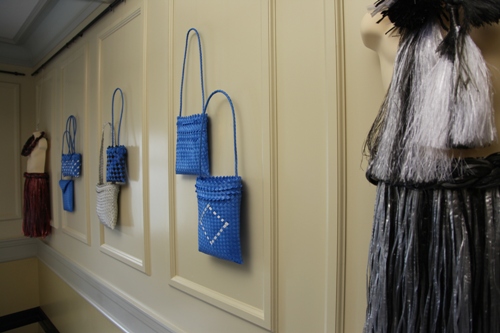Weaving with recycled materials in Pacific Focus Unit
30 January 2014
Using recycled materials to weave mats and baskets is teaching prisoners at Spring Hill Corrections Facility about the importance of protecting the environment.
 Mary Ama, who teaches weaving to prisoners in Spring Hill’s Vaka Fa’aola (Pacific Focus Unit), says another benefit of using recycled materials such as plastic bags, packing tape and raffia is that they are readily available and donated by Auckland factories.
Mary Ama, who teaches weaving to prisoners in Spring Hill’s Vaka Fa’aola (Pacific Focus Unit), says another benefit of using recycled materials such as plastic bags, packing tape and raffia is that they are readily available and donated by Auckland factories.
“The big factories love it,” she says. “We take away their rubbish and use it to show prisoners how to create beautiful woven mats and baskets.”
Two volunteers from Pacifica Mamas – a group of women representing cultures from the Cook Islands, Samoa, Tonga, Niue, Fiji, Tokelau, Tuvalu, Tahiti and Hawaii – join Mary and the Saturday morning classes.
The Mamas, who are based in the Waitakere Pacific Arts and Cultural Centre, collect the donated materials from the factories. They then sort and prepare the materials before taking them to Spring Hill Corrections Facility in Te Kauwhata, south of Auckland.
Mary is of Cook Islands heritage and a leading tivaevae (Cook Islands quilting) artist. Also a Community Development Facilitator with Auckland Council, she’s been passing on her skills and knowledge to prisoners in Vaka Fa’aola since 2009.
Weaving in the fale
Every Saturday, 30 to 40 men sit on the floor of the fale (meeting house) in Vaka Fa’aola. For the next three hours, they learn about their cultural heritage; discover new weaving techniques; and participate in storytelling and singing.
 “They come every Saturday and are very keen to complete their projects and start new ones,” Mary says. “They are very proud of what they have made.”
“They come every Saturday and are very keen to complete their projects and start new ones,” Mary says. “They are very proud of what they have made.”
In late 2012, woven baskets and performing arts costumes made by the prisoners featured in Arts Access Aotearoa’s exhibition of prisoner art in the foyer of Parliament House in Wellington.
“Having their work exhibited in Parliament gave the men a real boost because it recognised their talent and the skills they have learned,” she recalls.
Mary returns to Rarotonga as often as she can – usually three times a year – where she holds tivaevae workshops with local women.
“We share stories, skills and ideas, and I bring these back to Auckland with me,” she explains. “I was in Rarotonga in December and I discovered a new pattern for a mat using the traditional knotting technique.
“I showed this technique to the men at Spring Hill and we’ve just completed some of these big mats using recycled plastics. The men really enjoyed sitting on the floor and working together on these mats. They told stories and talked about their grandfathers using the same knotting technique to make fishing nets.”
Pride in cultural heritage
Vaka Fa’aola and its cultural programmes are vital in teaching prisoners about the mana of their heritage, Mary says. “These men all come from backgrounds where they have missed out. Many of them have a natural talent but that’s not enough. In our weekly sessions, we talk a lot about the importance of being proud of their cultural heritage.”
 The men need to accept the mistakes they have made, she says, and then learn about their heritage and who they are. Once those two things happen, they can move forward with motivation and greater confidence.
The men need to accept the mistakes they have made, she says, and then learn about their heritage and who they are. Once those two things happen, they can move forward with motivation and greater confidence.
“It happens a lot but it’s not easy,” Mary says. “It can take time and I have to be patient.”
The arts and creativity are intrinsic to the Pacific way of life. For some of the prisoners, Mary says, weaving and making crafts using the donated recycled materials can be a source of income when they are released.
For these men, community support and a place to create and sell their work are important. “There’s an open invitation to the men to link up with the Mamas when they are released. That ongoing support helps them retain the knowledge and skills they learned inside and provides a strong base where they can sell their work and earn some income.”
An exhibition of the prisoners' work, called Polynesian Creations, is on display in Parliament's Bowen House, open to the public three days a week (Wednesday to Friday), 10am to 3pm, until 2 May.



